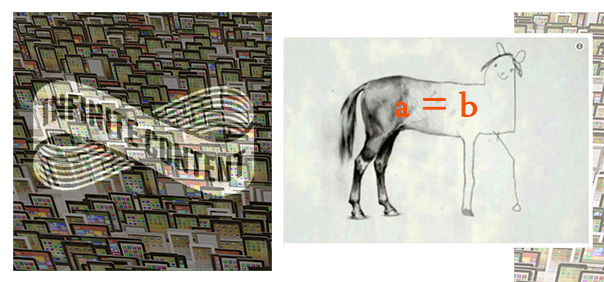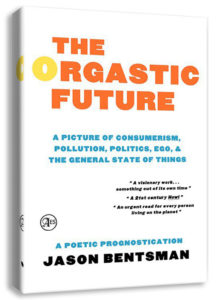|
Philosopher Michel Meurisse on how New Media and Social Media have decimated attention spans, discrimination between Deep & Shallow, intellectual rigor, real connectedness, and general appreciation… and what might be done to escape being a Content Consumer |

The Last Take
( or What It Means To Be Human In 2019 )
I.
It’s 2019 and something disquieting is emerging. We almost cannot see it because it’s too near, but it’s slowly beginning to come into focus. In our bodies it feels like something between weariness and nausea. It is one cultural problem that is not caused by our abject politics. But our current political despair is one of its symptoms.
The Deadspin writer Tom Ley came as close as anyone has yet to tracing its outlines. In a recent piece entitled “The Content Maw,” he pointed out how “the technologies that allow for and even demand the creation of content advanced to a point that the content creators, and thus consumers, have been left choking in the dust.” In short, the limitless proliferation of platforms for producing and receiving Content—TV, blogs, iTunes, Hulu, Spotify, Twitter, Facebook, Periscope, Netflix, smartphones, podcasts, etc—have created a cultural environment where anything that can be said is probably being said. Useful things and plenty of the utterly useless.
There are “good” TV shows, insightful blogs, and so forth, but they exist in the context of a boundless river of shit that swamps their significance. Good art and valuable information is automatically devalued by the sheer, limitless enormity of Content that we wade through on a daily basis. No show, or post, or idea is so intriguing that we will not likely forget it within 24 hours.
Putting it yet differently: Form has exceeded Content to such an extent that Content is now empty, fungible, completely interchangeable with other Content.
This week, for instance, I read a very insightful and well-written Op-Ed by Pankaj Mishra in the New York Times critiquing the current British ruling class over Brexit, and placing their malignance in the context of British Imperialist adventurism. Ten years ago, I might have sent it to a friend and discussed it, or thought about it more deeply for a few days. Not today. Today, information comes at us too fast to linger too long on anything. Shakespeare could return from the dead and publish a new sonnet in The New Yorker. It would be a sensational event—for a week, maybe. And then our attention would drift elsewhere and we would scarcely think of it again.
II.
This sudden explosion of Content has resulted in material changes in how we are human. We assume here the human not as a fixed form but as an ever-changing concatenation of possibilities of being, possibilities that are conditioned by our material reality.
III.
Here is what it means to be human in 2019.
It means to be cynical. In a world of limitless takes, think piece, opinions, art, music, the value of any Content seems to grow lighter… Where one could once take ideas seriously, for instance, today they are balloons floating away in the breeze. It is a trite point, but where everyone can be a “writer,” now no writer conveys any particular intellectual authority. Where limitless ideas are available, no idea is vital. Where new music is coming at us every millisecond, and all music ever created in the past is at our fingertips, individual pieces that once seemed essential or even sacred are cheap.
It means to be isolated. It is another trite point that, with the limitless number of choices for Content available, people increasingly are all on different channels. When I was younger, it seemed like every adult I knew could bond over the latest episode of MASH or Cheers. Today, any shared reference point has vanished. Moreover, we are alone because it simply takes a great deal of time to consume as much Content as we feel we need to, and consuming is, largely, a solitary activity. To watch the shows that appeal to us, listen to the podcasts that have been on our list, read the news sites that we want so that we stay informed, all of this takes up hours now of our day that are not spent interacting with others meaningfully.
It means to be frozen eternally with hesitation.
Once upon a time, I’d like to imagine that people consumed Content with the intent of doing something meaningful with it: finding a recipe online to then cook an actual meal; spending time on social media to actually meet with people in the real world; reading an article to actually then go engage with the world more fully. Somewhere along the way, something insidious happened: the process of consuming information somehow became not a means but the end in itself. We read far more news, blogs, gossip, data than could ever be practically useful to us. We watch cooking shows not to cook, but just to watch. We interact with others on social media not to form deeper connections, but to eavesdrop and remain alone.
Consuming Content is no longer a means, but a masturbatory ritual. We know that it is addictive (and now talking about our addiction is the newest form of masturbation), but we’re too far gone to come back.
Marx said famously: “Philosophers have only interpreted the world, in various ways. The point is to change it.”
IV.
Humans want to know things before we act. The “Content maw” preys on this natural desire. We naturally seek knowledge about other people on social media; we seek knowledge about the world through blogs and news sites; we seek knowledge online about things important to our life (what’s that rash on my leg, am I paying too much for car insurance, and so on). I spend hours on Spotify because I want to know more about my favorite musicians.
We have been lulled into a “paralysis of analysis.” The online world is full of professional knowers and their takes. Maybe we are all professional knowers now.
Kierkegaard wrote: “The present age is one of understanding, of reflection, devoid of passion, an age which flies into enthusiasm for a moment only to decline back into indolence.”
With every passing day, we are more content to Consume rather than to Act, to participate in the useless circulation of Knowledge than to Engage in the world. What today passes for Action is frightfully pusillanimous: a politician makes a heated remark and it gets replayed on the news for 24 hours. One celebrity says something “scandalous” about another celebrity, and we all agree that something has really “happened.” To show our political involvement, we post ardent, clever political opinions on Facebook, and all conspire together in the lie that we have “done” something. But in none of these cases has real Action ever occurred; we content ourselves with slights of hand to convince ourselves that something is actually happening.
V.
In my fantasy, this essay is the last take. After this piece, we decide that we have had our fill of Consuming and we can begin to step into life as it is.
The life that exists when we’re not Consumers… Cooking a meal with a friend… sitting on a park bench listening to the sounds of the city around you… making love with someone… walking in the woods… writing in a journal… playing a musical instrument… being together… listening to each other… caring for one another… taking photographs on good cameras… doing a crafts project… enjoying the feeling of freshly laundered sheets… having an intellectual discussion with a friend… sailing… swimming… shopping in a market… putting in a good day’s work at your job… playing with a child… repairing something in your house… meditating… jogging… practicing yoga… learning a new language… cradling a glass of red wine on a cold winter’s night.
The river of shit will flow on. Content will continue to come at us hot and fast, and we will always feel the urge to keep Consuming. The world will change when we are able to say, at last, that we have Consumed enough. We have seen enough. We know enough.
No one will give us permission. Just the opposite, the realm of Content will tell us that we need more before we are ready. Once we have consumed just a bit more… then we will be ready. Once we’ve browsed just a bit more… eavesdropped just a bit more… zoned out into the Screen just a bit more…
To decide not to be a Consumer anymore, therefore, is a leap of faith (another Kierkegaardian concept). To truly Act, to break free from the “paralysis of analysis,” one must simply do it. In this sense, you always take action before you are ready. This is the meaning of Action. Not to complete the circulation of Content—because it never completes, it just spins in an endless loop—but to suspend it entirely. To take Action is to rest in what knowledge you have, to rest in what you have Consumed, and know that it is enough, whatever it is.
VI.
To step into life is to simply step away from the world of screens and devices without a second thought.
All of the platforms that serve you Content. Break them and don’t look back. It’s time to burn the whole thing down and start over.
Only in breaking free from the realm of Content can we emancipate the arts and sciences. Writing can one day be writing again, and not empty Content. Music can be music again. Film can be film again. The truth can be true again.
It seems that colors themselves have faded (and greens can be green again, and yellows yellow).
If you think about it too long, or post about it on Instagram, you’re already lost. Just burn it all down, immediately.
In ceasing to be Consumers, we regain what it means to be human. When we all, collectively, cease to be Consumers, then we can begin to restore our garbage culture.
Step away from your Content and into the world.
— About the author
Professor Michel Meurisse is standing on a space rock traveling 67,000 miles per hour. What a feeling. Don’t try to find him on Instagram or Facebook, because he’s intentionally avoiding you. Not everyone: you specifically. In his free time, he enjoys waterskiing and regret.





Recent Comments